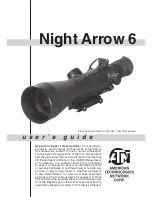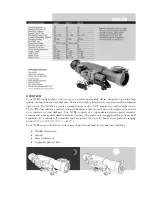
26 • Telescope Basics
Nighttime Observing
Looking at objects in the sky is quite different than looking at objects on Earth.
For one, many objects seen in the daytime are easy to see with the naked eye
and can be located by using landmarks. In addition, objects on the ground are
stationary, at least for the most part. In the night sky you will see a tremen-
dous amount of stars through the telescope that are not visible to the naked
eye. One way to find objects (at least initially) is by using other stars to guide
you there. This method of finding objects, known as star hopping, is very
accurate. Yet it requires a fair amount of time to learn the stars well enough to
guide you to other objects. In addition, the stars will appear to drift out of the
field of view. This is due to the Earth’s rotation. In fact, anything in the sky,
day or night, will drift out unless the telescope has been polar-aligned and the
optional motor drive is running. There is more on this in the section on “Polar
Alignment.”
1.
Orient the telescope so that the equatorial mount is pointing north, as
close to true north as possible. You can use a landmark that you know
faces north to get you in the general direction.
2.
Adjust the mount until the latitude indicator points to the latitude of your
observing site.
3.
Insert the eyepiece (low power) into the telescope to give you the widest
field possible.
4.
You are now ready to observe.
5.
Release the right ascension and declination clamps and point the tele-
scope at the desired target. The Moon or one of the brighter planets is an
ideal first target.
6.
Locate the object in the finder.
7.
Lock the R.A. and DEC clamps to hold the telescope in place.
8.
Center the object in the finder using the slow motion knobs.
9.
Turn the focus knob until the image is sharp.
10. Take your time and study your subject. If looking at the Moon, look for
small details in the craters.
That’s all there is to using your Celestron telescope. However, don’t limit your
view of an object to a single eyepiece. After a few minutes, try using a different
optional eyepiece, a more powerful one. This gives you an idea of how the field
of view changes.











































